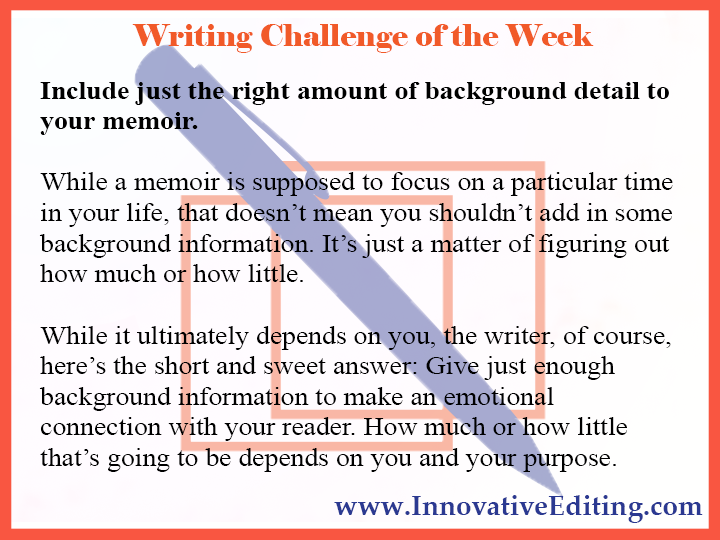Narrowing It Down From “Too Much”
- Jeannette DiLouie
- Jul 5, 2018
- 2 min read

Because memoirs are technically about just one significant point in their authors’ lives, they do pose an immediate problem.
What about everything else?
My memoir might be meant to focus on that peanut butter and jelly Eggo sandwich shop first mentioned on Tuesday. But so much in my life came before that venture, and it’s stuff that means a lot to me.
What stays and what goes?
If that’s what you find yourself asking about your memoir, that’s completely understandable. And there is an answer available, though it isn’t always clear-cut. That’s why the instructions below form a Writing Challenge and not a Writing Rule.
Include just the right amount of background detail to your memoir.
While a memoir is supposed to focus on a particular time in your life, that doesn’t mean you shouldn’t add in some background information. It’s just a matter of figuring out how much or how little.
While it ultimately depends on you, the writer, of course, here’s the short and sweet answer: Give just enough background information to make an emotional connection with your reader. How much or how little that’s going to be depends on you and your purpose.
To help you determine “you and your purpose,” there are a few different angles to consider while sorting through your history. The guiding questions below hardly cover all those angles, but they’re still a great place to start.
How relevant is that particular background detail to your memoir? Every single experience you have does end up shaping who you are and how you instinctively want to behave. Which means that every single experience you have matters. To you. Not necessarily to your memoir. One great way to make an emotional connection, as our Writing Challenge above charges, is to make a logical case for it. Present endearing or inspiring or otherwise captivating background details about your past that rationally build up to your present. It’s like a relationship: You’re making a case why someone else should want to stick around.
How interesting is it, or how interesting can you make it? I added that clarifying clause for a reason, and it’s not to encourage you to lie. Believe it or not, it is possible to enhance a completely factual everyday occurrence without altering it. If the background detail is relevant to your memoir’s purpose but you’re concerned it’ll seem dull to readers, try adding in some humorous commentary. Or mention someone famous who had a similar experience. Choose emotionally laden vocabulary and word arrangement. In other words, get creative! Facts don’t have to be boring when you know what to do with them.
Consider whether you can slip certain facts further into your memoir. When you’re on a first date, I doubt you dump your entire date-relevant history onto Mr. or Ms. Love Interest right away. If things go well, you’re bound to have other opportunities to share. It’s the same with setting up a story – even a non-fiction story. There are certain background details you want to establish fairly fast. Others can casually come up in “conversation” chapters later. Don’t feel forced to divulge everything at the offset.
In fact, don’t feel forced to divulge anything when memoir writing is an art, not a science. That’s just how emotional connections are made.




